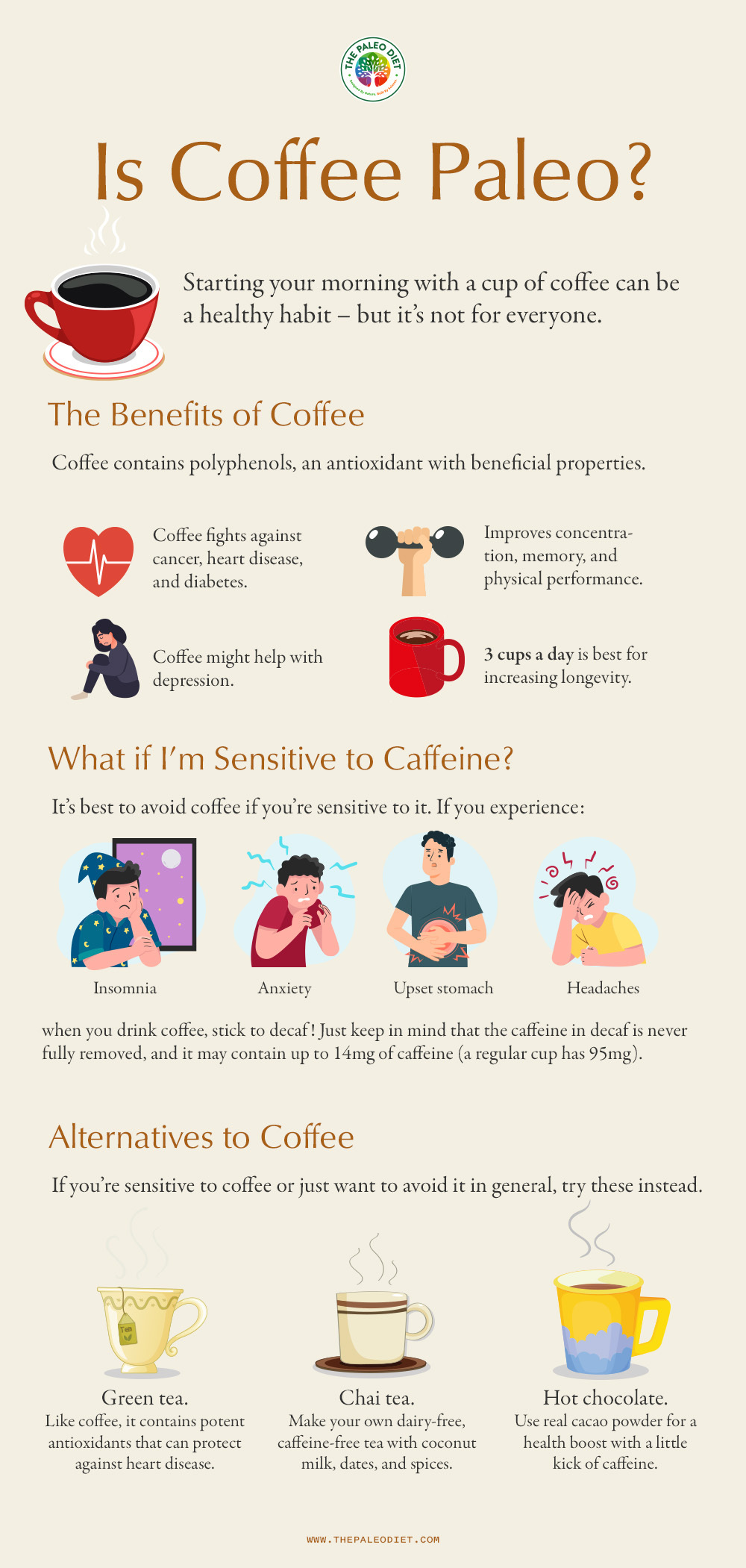Is Coffee Paleo? Why Coffee Is Healthy for Most People

Reviewed by Dr. Mark J. Smith on October 4, 2024
If you need a cup of coffee to get going in the morning, are you in line with The Paleo Diet®—or are you starting your day on the wrong side of your 85/15 principle? Whether coffee is Paleo or not is a common debate in the Paleo community.
With so much research and so many health variables to consider, it’s hard to give a definitive answer. Even we at The Paleo Diet once said that we did not consider coffee to be healthy, but we have since updated our stance based on the latest research. Here’s why sipping coffee every day can be healthy, and when you should consider taking a caffeine break.
What Is Coffee?
You may be wondering if coffee “beans” can ever be Paleo, and the good news is that coffee is not a legume! The coffee “bean” is only called a bean because of its shape, but it’s actually a seed from the Coffea plant.
The red or purple fruit that contains the “bean” is known as a coffee cherry, and the fruit itself is categorized as a stone fruit. The coffee cherry is typically discarded during coffee-making, but it is becoming a superfood in its own right due to the many beneficial nutrients it contains. [1]
Here’s where things get a little tricky: Both the stone fruit and the seed of the Coffea plant contain caffeine. And the more commonly consumed coffee, derived from the “bean,” contains far more than the fruit.
The Health Benefits of Coffee
There’s a lot of research that shows, for many, coffee can help increase longevity, enhance performance, and improve overall well-being.
Longevity
When it comes to increasing longevity, more seems to be better. One study found that one cup of coffee (whether decaf or caffeinated) per day was associated with a 3% reduced risk of death, and for those who can handle three cups per day, the study showed a 13% reduced risk of death! [2]
While longevity is a great perk, most people are only thinking of improving their mental and physical performance when drinking coffee. Indeed, caffeinated coffee can improve mental concentration, memory enhancement, and physical performance. [3] For those who struggle with mental health, coffee drinkers are often less depressed than those who do not drink coffee. [4]
Antioxidants
Coffee also contains polyphenols, an antioxidant that has anti-inflammatory, anti-cancer, and other beneficial properties. [5] Diets rich in polyphenols can protect against certain cancers, cardiovascular disease, type 2 diabetes, and gastrointestinal problems. [6]
Gut Health
Maintaining a healthy gut contributes to a strong immune system, improved mood, healthy sleep, effective digestion, and brain health. Along with eating healthy foods on The Paleo Diet, drinking coffee may improve gut health and reduce the risk of metabolic syndrome. [7,8]
However, while moderate coffee consumption (<4 cups per day) had beneficial effects on oral and gut microbiota, excessive intake (>5 cups per day) was associated with reflux disorders, periodontal diseases, and progression of Crohn’s disease. [8] Moderating your consumption will also prevent the risk of insomnia and medication interactions also associated with excessive intake. [9]
How Do I Know If I’m Sensitive to Caffeine?
The rate of caffeine metabolism is quite variable from person to person, and as a result, so too is the effect it has on any individual. For most healthy adults, caffeine consumption is relatively safe. However, caffeine consumption can be harmful for some, and may lead to impairments in cardiovascular function, sleep disruption, and substance use. [10] Knowing how you personally respond to coffee should be key in deciding if you should drink it or not.
Signs You Are a Slow Caffeine Metabolizer
If you have symptoms of insomnia, jitteriness, upset stomach, headaches, or anxiety after drinking coffee, there’s a good chance you may be a slow metabolizer. The rate that you metabolize caffeine is genetic and cannot be changed. [11,12]
If the morning is the only time you can drink coffee because any other time will keep you up at night, you are likely a slow metabolizer. Consider finding a coffee alternative to improve your health, like black tea, green tea, matcha, or even a mushroom cacao latte.
Signs You Are a Fast Caffeine Metabolizer
One of the easiest ways to tell if you’re a fast or slow metabolizer is by noticing how coffee impacts your sleep. For most of us, if we drink coffee first thing in the morning, it won’t affect our sleep. The true test would be to drink coffee later in the day. If you’re able to enjoy coffee in the late afternoon to early evening, and by bedtime can fall asleep with ease, it’s a clear indicator that you are a fast metabolizer of caffeine.
Signs You Are a Slow-to-Moderate Caffeine Metabolizer
For those who can’t sleep after an evening coffee but can easily have one at lunchtime without any disruptions, you would be a slow-to-moderate metabolizer.
Lower-Caffeine Alternatives to Coffee
For those who are slow metabolizers of caffeine or want to avoid coffee for other reasons, here are some Paleo-approved alternatives that can give you a boost of energy.
Green tea is a great alternative to coffee. It contains potent antioxidants that can protect against degenerative diseases and can reduce the risk of stroke and coronary heart diseases. [13] Green tea also contains a moderate level of caffeine. In fact, one cup of green tea contains about a third of the caffeine found in one cup of coffee! Enjoy green tea mixed with frozen peaches for a refreshing summer beverage.
Do you like your teas in latte form? Try this coffee-free Paleo Chai + Turmeric Latte that might trick you into thinking you’re enjoying a caffeinated cup. It’s made with coconut milk, dates, and spices for a warm start to your day.
For chocolate lovers, try a homemade hot chocolate made with real cacao powder. Similar to green tea, cacao is full of antioxidants that can slow down age-related illnesses. Plus, you’ll still get a bit of caffeine, though the amount is so small that it has little stimulating effects on the nervous system. [14]
Not ready to say goodbye to your morningcup of coffee? Or, do you want to use just a little bit of coffee in your morning cup? Skip the Starbucks and treat yourself to this delicious Paleo-Inspired Pumpkin Spice Latte that balances two cups of freshly brewed coffee with pumpkin puree and coconut milk. You can always adjust the balance!
What About Decaf Coffee?
Since coffee contains caffeine, would it be Paleo to drink decaf coffee?
Technically, no. Removing the caffeine from the plant is usually done through chemical processing that we consider too far from a natural, mechanical process. Our Paleolithic ancestors would not have had the ability to remove caffeine from coffee beans.
However, since The Paleo Diet follows a modern-day version of what our ancestors consumed, it’s fine to allow flexibility for foods and drinks that are healthy, even if they weren’t available in the Paleolithic era.
Also, be aware that the caffeine in decaf coffee is never fully removed. Each cup contains about 0–13.9 mg, while a regular cup of coffee contains approximately 95 mg of caffeine. [15] Much like deciding to drink coffee (or any other caffeinated drink) be sure to consider how it makes you feel before including it in your diet!
Coffee Is Fine for Most People
While we have said in the past that coffee is not Paleo, we have changed our position based on new research and we now believe that coffee can be beneficial for many people.
However, if you’re a slow metabolizer of caffeine, or you’re sensitive to how it makes you feel, pay attention to that. It may be best to avoid coffee and opt for tea or caffeine-free hot drinks instead. Listening to your body is always the best indicator of what foods and drinks you should include while on The Paleo Diet.
RELATED: Coffee Cart Accessories to Be an At-Home Barista
A Note on Sustainable Coffee
As one of the world’s most traded commodities, coffee and its consumption can obviously play a large role in the health of the planet. While in its infancy, there are now a number of initiatives being put in place by the coffee industry to produce sustainable coffee. Consequently, keep an eye on these initiatives as they become more available. [16]

References
- López-Parra MB, Gómez-Domínguez I, Iriondo-DeHond M, Villamediana Merino E, Sánchez-Martín V, Mendiola JA, Iriondo-DeHond A, Del Castillo MD. The Impact of the Drying Process on the Antioxidant and Anti-Inflammatory Potential of Dried Ripe Coffee Cherry Pulp Soluble Powder. Foods. 2024 Apr 5;13(7):1114. doi: 10.3390/foods13071114. PMID: 38611418; PMCID: PMC11011276.
- Li, Q, Liu, Y, Sun, X, Yin, Z, Li, H, Cheng, C, Liu, L, Zhang, R, Liu, F, Zhou, Q, Wang, C, Li, L, Wang, B, Zhao, Y, Zhang, M, Hu, D. Caffeinated and decaffeinated coffee consumption and risk of all-cause mortality: a dose-response meta-analysis of cohort studies. Journal of Human Nutrition and Dietetics 2019;32(3):279–287. https://doi.org/10.1111/jhn.12633.
- Cappelletti, S, Piacentino, D, Sani, G, Aromatario, M. Caffeine: cognitive and physical performance enhancer or psychoactive drug? Curr Neuropharmacol. 2015:13(1):71–88. https://www.ncbi.nlm.nih.gov/pmc/articles/PMC4462044/.
- Leviton, A. Coffee consumers are less likely than others to be depressed. 2020. National Coffee Association of U.S.A., Inc. Retrieved January 25, 2022, https//.www.ncausa.org/Portals/56/PDFs/Communication/20200504_Leviton_white_paper_final.pdf.
- Yamagata, K. Do coffee polyphenols have a preventive action on metabolic syndrome associated endothelial dysfunctions? An assessment of the current evidence. Antioxidants 2018;7(2):26. https://doi.org/10.3390/antiox7020026.
- Cory, H, Passarelli, S, Szeto, J, Tamez, M, Mattei, J. The role of polyphenols in human health and food systems: A mini-review. Front. Nutr. 2018;5:87. https://doi.org/10.3389.fnut.2018.00087.
- González, S, Salazar, N, Ruiz-Saavedra, S, Gómez-Martín, M, de Los Reyes-Gavilán, CG, Gueimonde, M. Long-term coffee consumption is associated with fecal microbial composition in humans. Nutrients 2020:12(5):1287. https://doi.org/10.3390/nu12051287.
- Saygili S, Hegde S, Shi XZ. Effects of Coffee on Gut Microbiota and Bowel Functions in Health and Diseases: A Literature Review. Nutrients. 2024 Sep 18;16(18):3155. doi: 10.3390/nu16183155. PMID: 39339755; PMCID: PMC11434970.
- Raza ML. Coffee and brain health: An introductory overview. Prog Brain Res. 2024;288:1-22. doi: 10.1016/bs.pbr.2024.06.010. Epub 2024 Jul 15. PMID: 39168553.
- Temple, JL, Bernard, C, Lipshultz, SE, Czachor, JD, Westphal, JA, Mestre, MA. The safety of ingested caffeine: A comprehensive review. Front. Psychiatry 2017;8:80. https://doi.org/10.3389/fpsyt.2017.00080.
- Nehlig, A. Effects of coffee/caffeine on brain health and disease: What should I tell my patients? Practical Neurology 2016;16(2):89–95. https://pn.bmj.com/content/16/2/89.
- Nehlig, A. Interindividual differences in caffeine metabolism and factors driving caffeine consumption. Pharmacological Reviews 2018;70(2):384–411. https://doi.org/10.1124/pr.117.014407.
- Chacko, SM, Thambi, PT, Kuttan, R, Nishigaki, I. Beneficial effects of green tea: a literature review. Chinese Medicine 2010;5(13). https://doi.org/10.1186/1749-8546-5-13.
- Katz, DL, Doughty, K, Ali, A. Cocoa and chocolate in human health and disease. Antioxidants & Redox Signaling 2011;15(10):2779–2811. https://doi.org/10.1089/ars.2010.3697.
- McCusker, RR, Fuehrlein, B, Goldberger, BA, Gold, MS, Cone, EJ. Caffeine content of decaffeinated coffee. Journal of Analytical Toxicology 2006;30(8):611–613. https://doi.org/10.1093/jat/30.8.611.
- Wright DR, Bekessy SA, Lentini PE, Garrard GE, Gordon A, Rodewald AD, Bennett RE, Selinske MJ. Sustainable coffee: A review of the diverse initiatives and governance dimensions of global coffee supply chains. Ambio. 2024 Jul;53(7):984-1001. doi: 10.1007/s13280-024-02003-w. Epub 2024 Apr 29. PMID: 38684628; PMCID: PMC11101400.
Irene Jay
Irene Jay is a Holistic Health Coach and a certified Nutrition Coach from Vancouver, BC.
More About The Author




